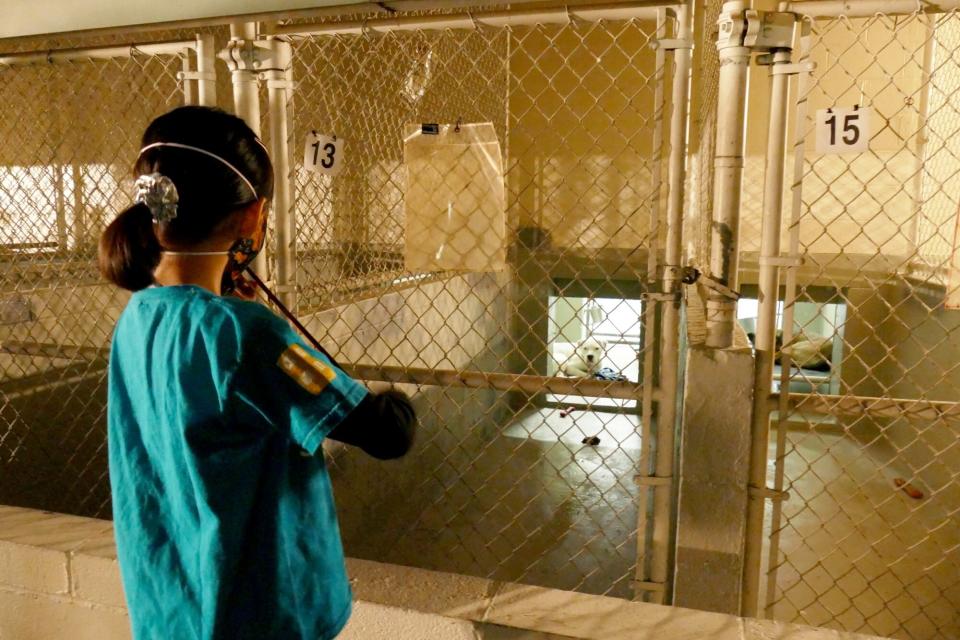Kids Perform Classical Concert to Soothe Shelter Dogs in North Carolina
It was a concert unlike any other. Upon the conclusion of the first piece, the musicians bowed. The audience… well, it bow-wowed.
The performers? Ten children, aged seven to fourteen, studying music at Arts+, an arts education organization in Charlotte, North Carolina.
The audience? Homeless dogs at the Humane Society of Charlotte, awaiting forever homes.

Courtesy of Arts+
An idea of mutual benefit, as important as it was adorable, inspired the performance. The children performed to help the animals. Research shows that classical music relaxes animals in shelter environments. Although the Humane Society of Charlotte regularly plays music for its animals, this would be their first live performance. During a year when shelters across the country refilled after the popularity of pandemic puppies waned, this stress relief grew more important for animals who waited longer to find homes.
But the dogs helped the young musicians, too. Public performances can be intimidating, even for seasoned professionals; imagine the stress for a child who's learning an instrument but hasn't played for an audience during 18 months of COVID-19 restrictions. To ease the children's anxiety, Marissa Keener—the Arts+ Suzuki coordinator—wanted their debut concert performed for an audience known for its attentiveness and unwavering acceptance.
"Kids and animals are the most perfect combination," says Shelley Lyttle, a former sixth grade teacher who manages Youth Programs for the Humane Society of Charlotte. "Dogs and cats don't judge us. Being with them is relaxing. Especially with our reading-based programs, it's a lot less intimidating for kids to read aloud to a furry, drooling wigglebutt than it is to read to a teacher or a room full of classmates. Especially for kids who are trying to build their confidence, it's important for them to get into that moment [with animals] and do what they know they can do."
Arts+ and the Humane Society of Charlotte applied research on canine-assisted reading to music education. The idea shifts the children's focus: Instead of fearing how their performance will be received, they can focus on being helpers to animals in need.
"A human audience will definitely give you feedback. An animal audience will not. So, in a way, it was a great experience for them to have a different kind of performance," Keener says. "It was a lower pressure situation."

Courtesy of Arts+
Keener already had a hunch this would work. While she taught students virtually during COVID-19 restrictions, she got a window into their home lives. Oftentimes, next to a child practicing an instrument would be a pet. Animals were already silent, loyal supporters of children's music education.
The audience that night was rowdier than expected, however. The opening songs were greeted by enthusiastic barks that nearly overpowered the violins and cello. The children, with the composure of pros, played on, performing between two runs of amped-up dogs. But a beautiful thing happened. After about three songs, the runs slowly quieted. Pickle, a mutt, stood up, front paws pressed on the front of the run, to watch the children. Ralph, a brindle pittie mix, stopped pacing and whining and sat quietly. Thaddeus the Border Collie settled in for a nap. By the end, it was just Pecan, a 70-pound hound, who kept up with the children as a canine metronome.
"Music is a form of enrichment for dogs and cats," Lyttle says. "It's like mental exercise for them. So for them to hear the music and to see the kids playing for them, it makes them more relaxed – which makes them more adoptable, too."
This is just one way that the Humane Society of Charlotte has extended its mission. It's not just a place for animals to find humans; it's an organization that uses animals to help humans be better humans. Some dogs here have assisted in lessons in dog safety for children, and some have even been part of anti-bullying education.
"How we see animals, how we treat animals, and what they mean in our lives starts at an early, early age," says Shelley A. Moore, President and CEO of Humane Society of Charlotte. "We engage with [children] in a meaningful way where they can learn … how to be responsible, what compassion is, and what empathy is through these interactions with animals. It's part of our mission because we want to create a more humane world."
At the show's end, each dog got a solo performance. The children selected a dog to serenade, standing in front of its run. Then, together, they played Twinkle, Twinkle Little Star. Dogs stepped forward to listen quietly—even Pecan.
Then the dogs returned to their indoor runs to sleep, and the children packed up their instruments, feeling pride in helping homeless animals—even if they didn't realize how much the animals helped them, too.

